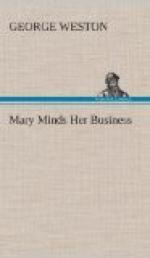“I know what it is,” said Miss Cordelia one night. “She has a mind of her own. Everything she sees or hears: she tries to reason it out.”
I can’t tell you why, but Miss Patty looked uneasy.
“Only this morning,” continued Miss Cordelia, “I heard Ma’m Maynard telling her that there wasn’t a prettier syringa bush anywhere than the one under her bedroom window. Mary turned to her with those eyes of hers—you know the way she does—’Ma’m Maynard,’ she said, ’have you seen all the other s’inga bushes in the world?’ And only yesterday I said to her, ‘Mary, you shouldn’t try to whistle. It isn’t nice.’ She gave me that look—you know—and said, ’Then let us learn to whistle, Aunt T’delia, and help to make it nice.’”
“Imagine you and I saying things like that when we were girls,” said Miss Patty, still looking troubled.
“Yes, yes, I know. And yet... I sometimes think that if you and I had been brought up a little differently....”
They were both quiet then for a time, each consulting her memories of hopes long past.
“Just the same,” said Miss Patty at last, “there are worse things in the world than being old-fashioned.”
In which I think you would have agreed with her, if you could have seen Mary that same evening.
At the time of which I am now writing she was six years old—a rather quiet, solemn child—though she had a smile upon occasions, which was well worth going to see.
For some time back she had heard her aunts speaking of “Poor Josiah!” She had always stood in awe of her father who seemed taller and gaunter than ever. Mary seldom saw him, but she knew that every night after dinner he went to his den and often stayed there (she had heard her aunts say) until long after midnight.
“If he only had some cheerful company,” she once heard Aunt Cordelia remark.
“But that’s the very thing he seems to shun since poor Martha died,” sighed Miss Patty, and dropping her voice, never dreaming for a moment that Mary was listening, she added with another sigh, “If there had only been a boy, too!”
All these things Mary turned over in her mind, as few but children can, especially when they have dreamy eyes and often go a long time without saying anything. And on the same night when Aunt Patty had come to the conclusion that there are worse things in the world than being old-fashioned, Mary waited until she knew that dinner was over and then, escaping Ma’m Maynard, she stole downstairs, her heart skipping a beat now and then at the adventure before her. She passed through the hall and the library like a determined little ghost and then, gently turning the knob, she opened the study door.
Her father was sitting at his desk.
At the sound of the opening door he turned and stared at the apparition which confronted him. Mary had closed the door and stood with her back to it, screwing up her courage for the last stage of her journey.




